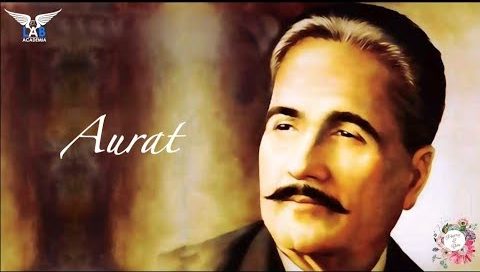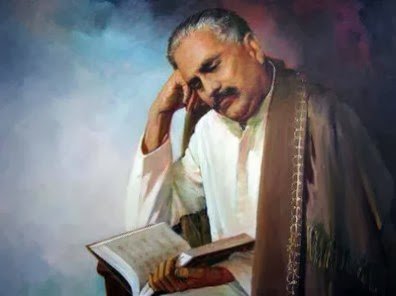Allama Iqbal was a poet, politician, and philosopher from Punjab, British India. His poetry in Urdu and Persian is among the greatest of the modern era. Iqbal has touched upon many vital subjects through his craft. One such issue was the significance of women and their rights and roles in a Muslim society.
Iqbal’s dissertations, research papers, lectures, and poetry such as ‘Ramooz-eBekhudi’, ‘Zareb-e-Kaleem,’ and ‘Javed Nama’ interprets his approach in terms of feminism and western attitude towards women.
Allama Iqbal has signified the importance of women in his poem “Aurat” as follows:

1) vaujd-e zan se hai tasver-e kintat me rang
Isi ke saz se hai zindag ka soz-e daron
Color in the portrait of the universe is from Woman
From her warmth is the inner warmth of life
2) sharaf me barh ke surayya se musht-e khak is ki
ky har sharaf hai isi durj k dur-e maknon
In glory, her dust is greater than stars
Each glory is the hidden pearl of her shell.”
Through Iqbal’s poetry, it is evident that he wanted Muslims to make the world a conventional home for women. He tried to bring meaningful changes in people’s thought processes, but he felt greatly troubled by westernized women and their inspirations and ideas.
Mard-e-Musalman
1) jauhar-e mard ayan hota hai be-minnat-e ghair
ghair ke hth me hai jauhar-e aurat k namood!
the essence/quality of man is plain, without indebtedness to another,
the manifestness of the essence/quality of a woman is in the hands of another!
2) raaz hai is ke tap-e gham k yahi nuktah-e shauq
Aatisheen, lāzat I -takhliq se hai is ka vujood!
of her sorrow and grief, this is the point of ardor–
her existence is inflamed with the relish of creating!
3) khulte jatey hain isi aag se asrar-e hayaat
garm isi aag se hai marikah-e bood-o-nabood!
they open out through this fire, the mysteries of life,
it is warm from this fire, the arena of existence and nonexistence!
4) mai bhi mazloom-e niswaan se hoon gham-nak buhut
nahi mumkin magar is uqdah-e mushkil k kushud!
I too am very sorrowful at the oppression of women,
but it’s not possible, the opening of this difficult knot!
There was a time in history where women only served as a means of sexual satisfaction and were considered lesser beings with no social or human rights.
Islam, as a religion, respects women and every role played by women. It commands its followers to do the same. Iqbal shares a similar point of view. He does not consider a woman weak or merely means of sexual satisfaction. He firmly believes in a woman’s sympathy, passion, and feminine strength.

Woman and Education: Aurat Aur Taleem
“1) tahzeeb-e firangi hai agar marg-e ummumat
hai hazrat-e insaan ke liye is ka samar maut!
if from European civilization is the death of motherhood,
for the presence/dignity of man, the fruit of this is death!
2) jis ilm k taseer se zan hoti hai na-zan
kahte hai isi ilm ko arbab-e nazar maut!
the knowledge through the effect of which woman becomes non-woman–
this knowledge, the possessors of insight call death!
3) beganah rahe deen se agar madrasah-e zan
hai ishq-o- muabbat ke liye ilm-o-hunar maut!
if the madrasah of woman would remain a strainger to faith,
then for passion and love, knowledge and skill are death! “
Iqbal has emphasized women’s education in his poem ‘aurat aur taleem’. He points out that women are an important segment of our society and they must be equipped with modern and Islamic education which then eventually will lead the young generation to better individual and community life. He also encouraged equal opportunities for getting an education as rendered to men.
The Protection of Woman
1) ek zindah haqiqat mery seene me hai mastoor
kya samjhe ga vuh jis ki rago me hai lahu sard
a living truth/reality is hidden in my breast,
how would he understand, in whose veins the blood is cold?
2) na pardah nah taleem nai ho keh purani
nisvaniyat-e zan k nigeahI -baan hai faqat mard
neither pardah nor education, whether it be new or old–
the guardian of the femininity of woman is only man
3) jis qaum ne is zindah haqiqat ko nah paya
us qaum ka khursheed buhut jald hova zard
the community that didn’t realize this living truth/reality–
that community’s sun very quickly became yellow [and faded]”
In Islam, men are responsible for women under their care. They play the role of maintainers and protectors of women which is a liability, responsibility, and not a position of authority.
